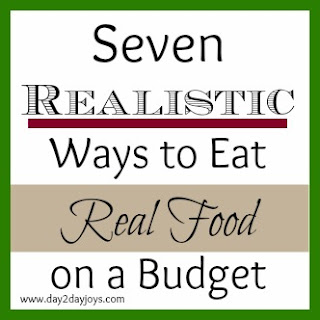Written by Jenn, Contributing Writer
Sometimes I come across blog posts or magazine articles about eating “real food”. Real food is basically foods that are natural, whole, unrefined and eaten as close to its original state as possible (i.e. a banana rather than banana flavored cereal). This definition does not include highly processed and refined food products, fast food and stuff out of boxes with more than a few ingredients.
Often these articles advocate an all-organic, all-the-time policy and while I think that’s a wonderful goal, I have realized that I can’t actually eat this way every day {unless I wanted to deprive my children of shoes, and when you live in a place where it can get 30 below zero in the wintertime, that’s not a good idea}.
So what’s a gal like me to do when she wants her family to eat healthy, real food but also lives in the real world with a budget?
I give to you seven realistic ways to eat real food on a budget. These have worked for my family, which includes my husband and I and three young and hungry children. I hope they are helpful to you as well!
Make room in your budget for real food
The beginning of a new year is the perfect time to sit down and create a budget for your spending {here are some tips for creating one that works for you!}. If you are committed to eating more real and whole foods this year, writing down how you currently spend your money will give you a chance to cut out spending in one area and then apply it to buying healthy food!
Grow a garden {or something as close as possible}
This is probably old news, but having your own garden is really the best way to get real food on a budget. There are a few start-up costs like buying seedlings, seeds, gardening tools and containers but they really can be purchased for a very small price or gotten for free. And get your kids involved If you don’t have a lot of room, a great book I’d recommend is Vertical Vegetable Gardening which is an excellent resource for small-space {and large-space} gardening! Other things to do if you can’t have a garden:
- Join a CSA, a community supported agriculture group where you get a share of fruits and vegetables throughout the year.
- Help someone with their garden in exchange for produce. For a few years we helped plant, weed and pick vegetables on a friend’s farm and were able to get a lot of food for our labor!
- Shop at a farmer’s market. If you go towards the end of the day, many vendors are happy to bargain with you on a price.
 |
| photo credit |
Join a co-op or buy fresh food in bulk
We currently order from Azure Standard, a family-owned business dedicated to providing customers with high quality organic and natural foods and products at a good price. Many times you can get organic fruits and vegetables for less than what their conventional counterpart costs in the grocery store! They sell organic flour, oats, rice and beans in bulk as well as many other natural products. We order most months and pick our items up at a nearby drop point.
Eat in-season fruits and vegetables for maximum savings
When you buy foods that are in-season, you can get them fresh and full of nutrients! Alternatively, you can freeze extra fruits and vegetables for later. Each summer, we buy a large amount of blueberries and portion them out into freezer bags so we can enjoy them all year. Find seasonal produce in your area of the United States at Sustainable Table, which lists fresh foods by state during each month of the year.
Get meat, dairy and eggs from a trusted source at a reasonable price
Even if it’s not certified organic, local meats and eggs from local chickens are still much better than the store-bought roll of ground “something”. If the prices seem steep for a quarter beef, for example, you could split it with a friend. Ask around the community: more and more people are raising chickens and grass-fed animals as well as selling their raw milk when allowed.
Start small and do one thing at a time
It’s not necessary to jump in full force, especially if your budget is limited. Choose one type of whole/organic/real food group that’s most important to you and your family’s health and make that your focus. It’s really worked for us to take small steps away from some of the processed things we like and toward a home where we eat {almost} all real food.
Make basic meals with your real food
My mom always cooked from scratch growing up even though were on a very limited income at the time. I’ve always enjoyed cooking from scratch myself but unfortunately I’ve let more processed foods sneak into our home than I should have. In getting “back to basics”, I’ve focused on making very simple meals: seasoned chicken, rice and a salad, whole wheat pancakes and sliced peaches and crock-pot taco soup with shredded cheese for example. Staying away from expensive spices, foreign ingredients and complex recipes keeps eating whole and real food affordable, even the organic variety.


















I really enjoyed this post. It is sensible and encouraging, with easy ideas that will make a difference. Thank you
Thanks for reading! That’s exactly what I was going for–practical and encouraging 🙂
This is my first time reading your blog. Thank you both for giving such wonderful, helpful information. I’m a food blogger and it’s SO difficult and frustrating that I don’t have the ability to use and afford real foods as often as I’d like to. Some of your tips will definitely help!
Thanks for reading my post and for the encouraging words 🙂
Preach it, sister! These are great tips. I also buy only small amounts of the really good foods that I can afford. Like we only eat ground beef once a month b/c a pound of the good stuff costs over $5. But I figure it’s better to limit our consumption of it in general than to buy the nasty stuff at the store. Some foods are not like that – vegetables for instance. I think it’s more important to eat plenty of those whether or not they are organic.
Yes, that’s a great point, Anne. Buying only small amounts of the really good stuff and limiting your consumption of that item so you CAN afford it. Thanks so much for your comment!
Great post. I just went to Whole Foods and its pretty pricey for a family of four but like you say start small. I will probably pick one item per pay period for dinner. Thanks for sharing.
Thanks for commenting–one step at a time is great!
Good post! We can in NO way afford to purchase organic but with our garden and raising our own animals, eating healthy became an option. It’s just in the area of oils (coconut, olive) that can get expensive but is worth the budgeting strategy. I like your comment about buying what is in season. This really makes a difference! I am visiting you from the Naturally Living Link up 🙂
Thanks so much for reading and for commenting! Sometimes it’s a bit painful to spend more money on food but yes, when it’s good for us, the spending is for good reason!
great article! what we do is we tend to eat less when its good real food so i buy less too!!
Thanks Megan!
Love this post Jenn! I just signed up with Azure Standard and hope they have a drop off point near me. 🙂
They’re expanding their delivery routes all the time, so hopefully you can buy from them! It’s great!